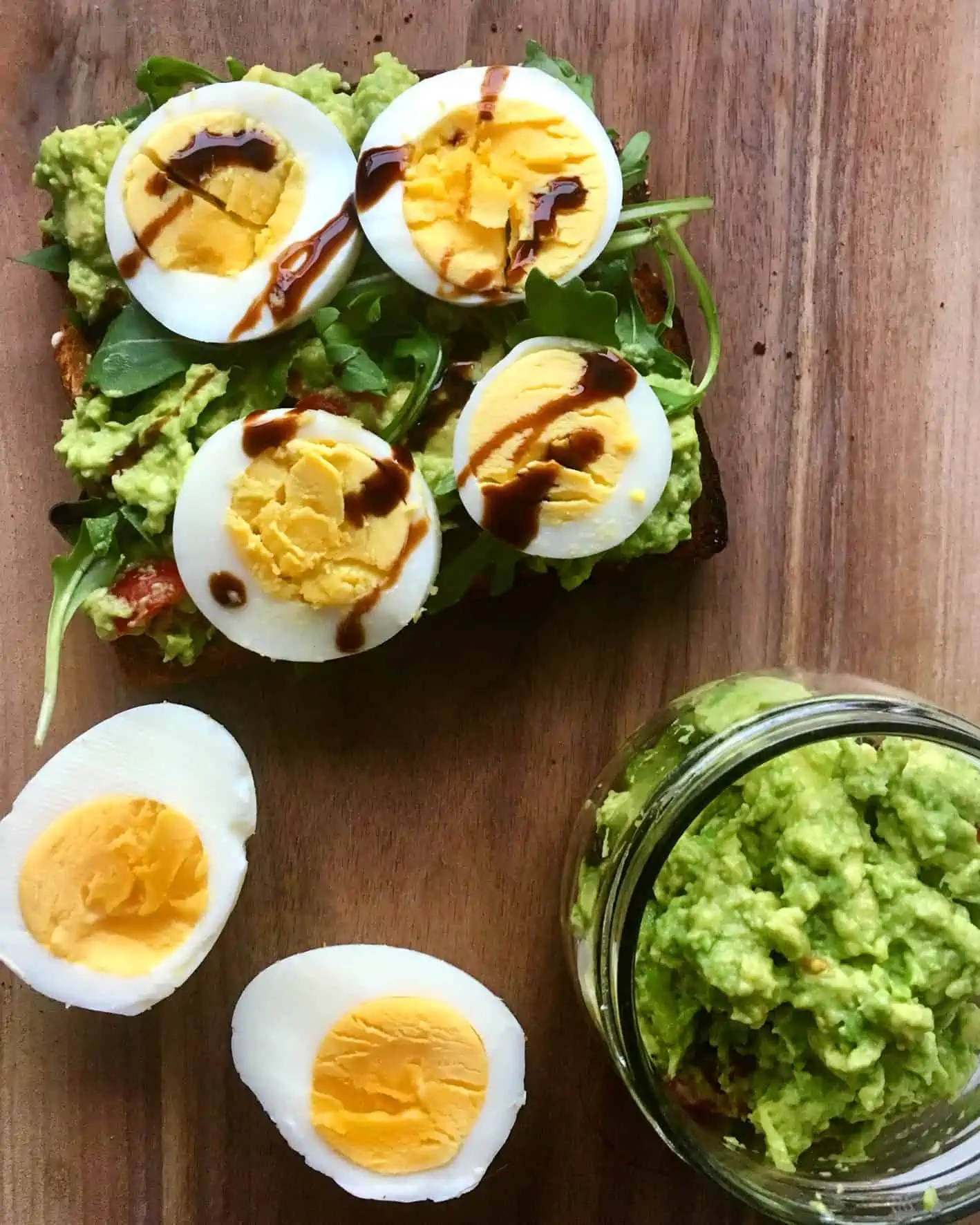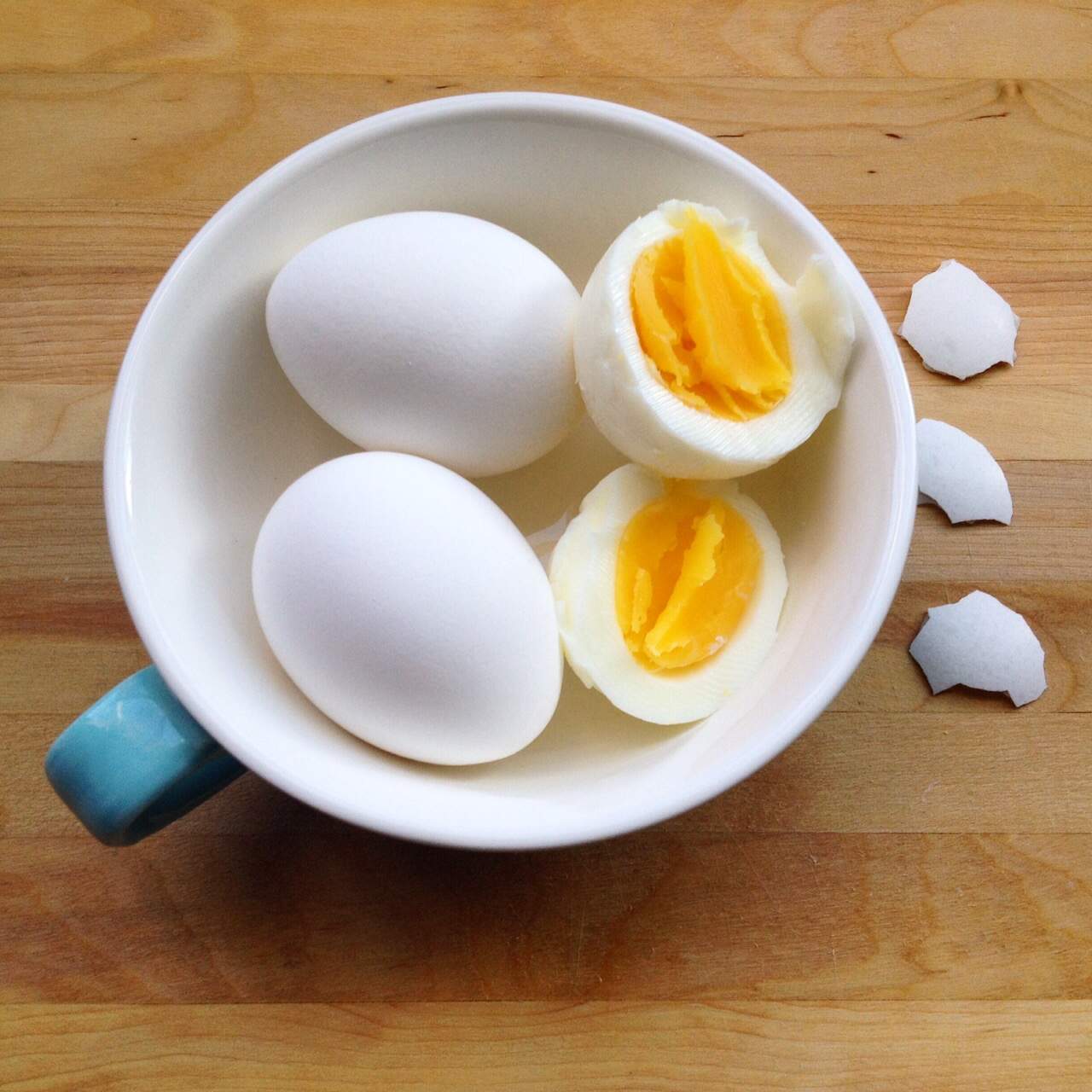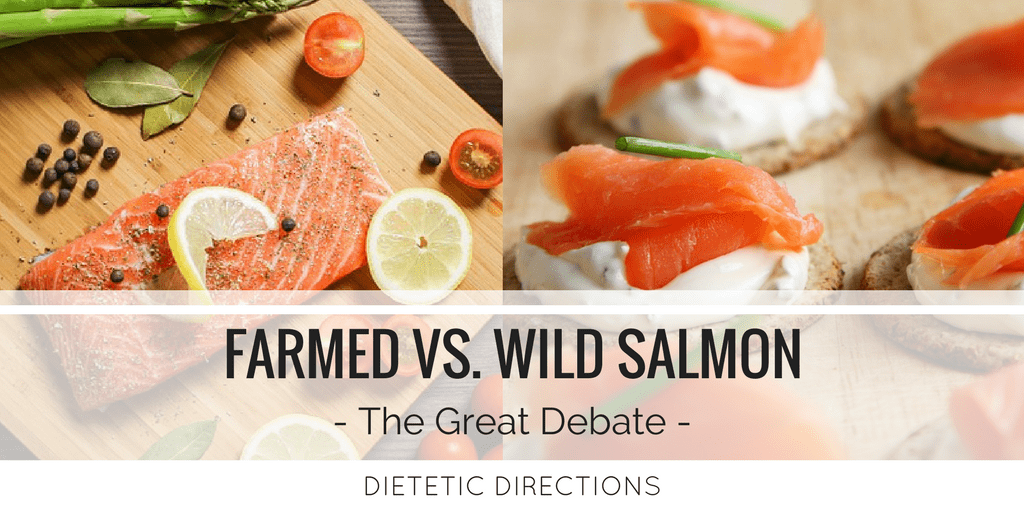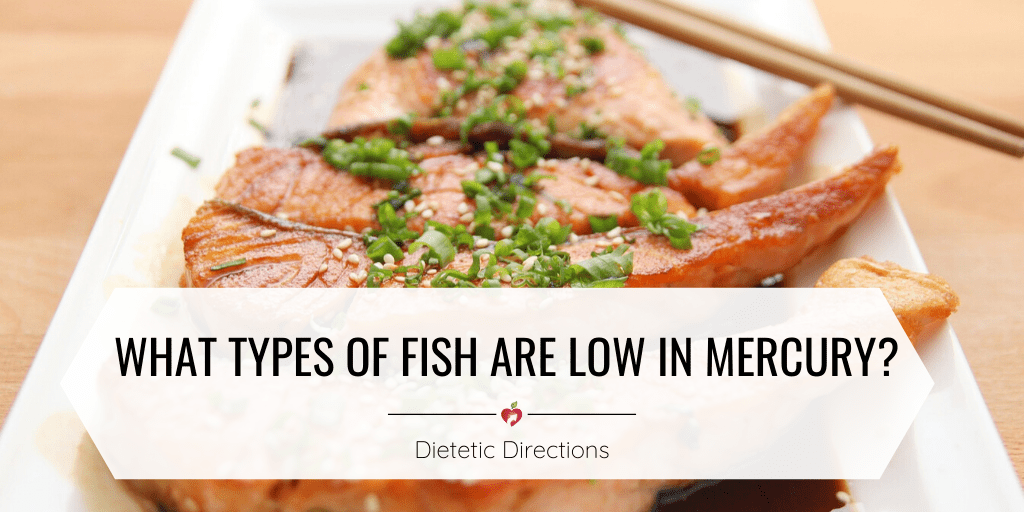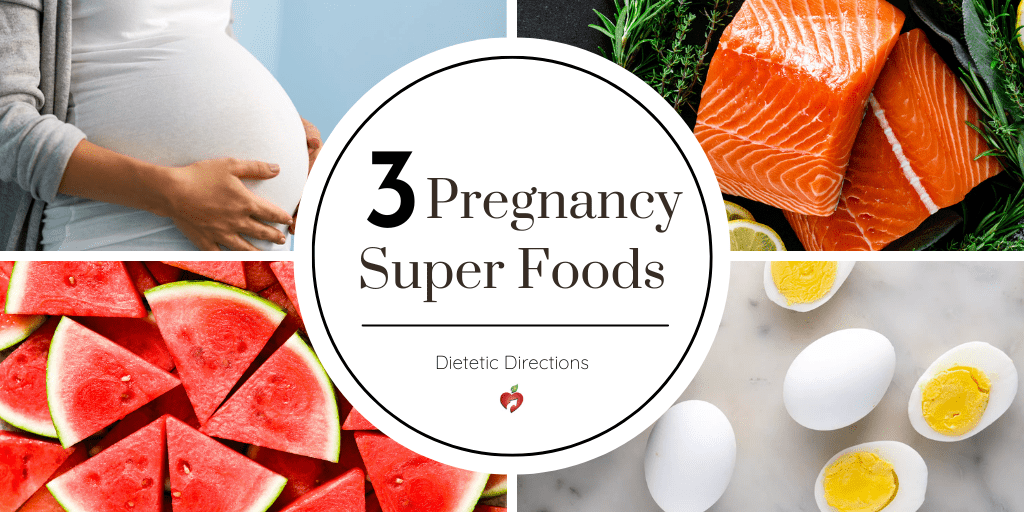
Pregnancy Super Foods
Pregnancy super foods are a powerful way to optimize your nutrition and that of your unborn baby. Undoubtedly, eating well during pregnancy is one of the best things you can do, especially with the increase in body demands as the baby grows and develops. Today’s blog takes a “food first” approach to meeting your changing nutrition needs. As a fellow momma-to-be, I’ll highlight 3 of my favourite pregnancy super foods and why I love them.

Curious how to optimize nutrition for your growing baby? Read on!
This post was sponsored by the Egg Farmers of Ontario, as always, all opinions are genuine.
My Pregnancy Story:
As a pregnant Registered Dietitian, I have become extremely familiar with optimizing diet during this special time. Feeling all the baby kicks and watching my increasing bump are reassurances that our little girl will be with us soon enough. After all, by prioritizing nutrition and a healthy lifestyle, the body can better handle the extra demands of pregnancy.

As a pregnant dietitian, I’ve been intrigued by how certain foods can improve the baby’s health & development.
Why is Pregnancy Nutrition Important?
- Pregnancy nutrient needs are often higher (for example: iron, calcium, vitamin D, choline and folic acid)
- The expansion in blood supply during pregnancy increases hydration requirements and iron demands for growth, brain development and the supply of oxygen and energy to the baby.
- The importance of calcium for building baby’s bones and teeth must be emphasized. If mom’s diet is low in calcium, baby will take from maternal calcium stores.
- Nutrition can help decrease or minimize risk of related health conditions like preeclampsia- (medial condition that causes sudden increase in blood pressure), gestational diabetes, high cholesterol, etc.
- Proper nutrition supports appropriate weight gain for mom and baby during different stages.
- Balanced nutrition can prevent energy crashes and cravings that lead to less healthy food choices.
- The foods we eat and the supplements we take support our immunity during pregnancy.
- Nutritious choices impact milk production for breastfeeding after baby is born.
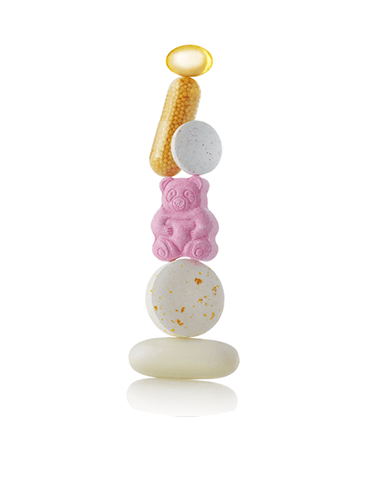
Vitamin and mineral supplements are often necessary to meet increased needs; however, speak with a Registered Dietitian for individualized advice based on your intake first.
3 Pregnancy Super Foods:
- Watermelon as a Pregnancy Super Food
My list of pregnancy super foods starts with watermelon because it’s one of the most hydrating foods. In fact, watermelon is 92% water with key nutrients like vitamin C (20% of daily requirement in 1 cup serving) along with vitamin A and some potassium and magnesium. Additionally, watermelon is not just a summer fruit since the United States is the number one exporter of watermelon to Canada, making it available to enjoy all-year-round. One cup of watermelon is only 50 calories making it a low calorie snack that bumps blood sugar and provides sweet enjoyment. Furthermore, watermelon is rich in antioxidants, including lycopene, which can be beneficial for maternal blood pressure and gestational diabetes prevention.
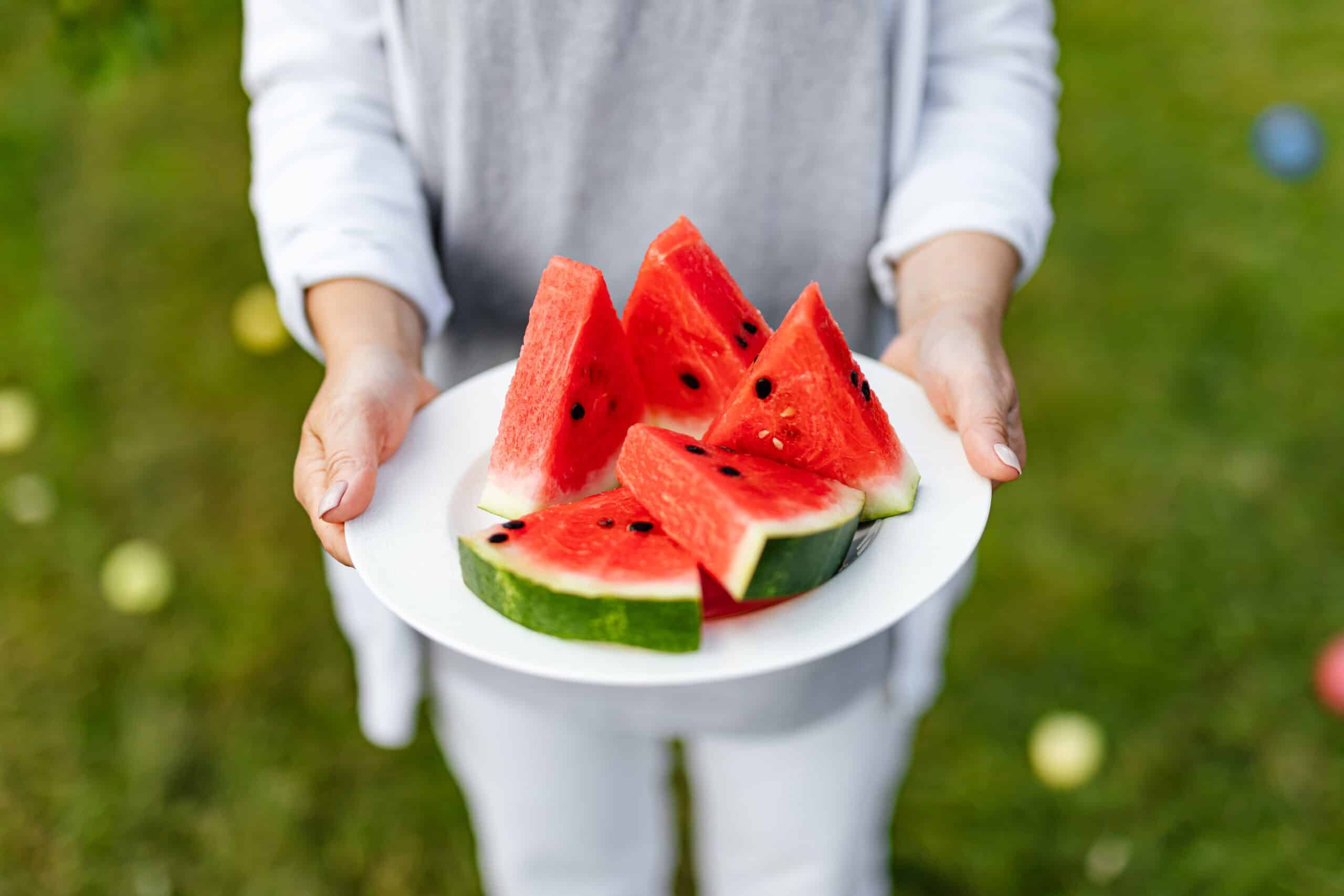
Watermelon is 92% water and a great source of vitamin C.
Why is Hydration Important During Pregnancy?
Hydration is SO beneficial, particularly during pregnancy to support the increased blood volume demands. Consuming 8 to 12 cups of water every day is recommended. Furthermore, staying hydrated helps with bodily/organ functions such as: nutrient delivery to cells, amniotic fluid support around the fetus, body temperature regulation, digestion aids, alertness and waste removal.
Discover 3 Pregnancy Super Foods with Andrea Registered Dietitian of Dietetic Directions! Share on XHydration Boosting Tips:
- Drink water throughout the day, not just when you’re thirsty. Have your favourite water bottle handy by your desk, in your car, by the TV, etc.
- Include homemade soups to boost hydration.
- Choose unflavoured, unsweetened waters instead of sugary alternatives.
- Include extra hydrating fruits (strawberries, cantaloupe, peaches, oranges) and veggies (cucumber, lettuce, zucchini, celery and tomatoes) in smoothies, as a side-dish or added to salads.
- Enjoy hydrating fruits for a pre-workout snack to act as a carbohydrate energy source.
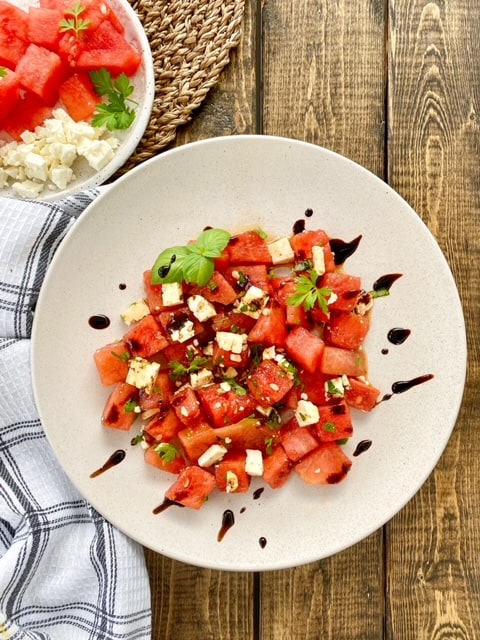
DYK: 1 cup of diced watermelon contains 20% daily vitamin C
- Eggs as a Pregnancy Super Food
No yolking around – eggs are a pregnancy super food due to their high protein and leading choline content. Choline is an under-consumed nutrient that supports the baby’s brain and spinal cord development. Interestingly, even if a woman is getting adequate folic acid, her risk of neural tube defects increases if not getting enough choline. Luckily, two eggs contain 12 grams of protein and ~70% of her daily choline requirement. However, remember not to skip the yolk since this contains most of the choline and half the protein.
Eggs are a choline-rich, pregnancy super food. Try them in this Avocado Egg Toast recipe!
Why are Eggs Nutritious?
Eggs contain 14 essential nutrients like lutein, selenium and vitamin A, all which support a healthy pregnancy and body functioning. Interestingly, eggs are super fresh and go from farm to grocery store in 4 to 7 days in Ontario. Additionally, they’re a cost-effective protein source that leads to many quick and easy meals.
DYK: Two eggs contains 70% of daily choline for a pregnant woman.
Why is Choline Important During Pregnancy?
Choline is deemed “an essential nutrient” because it’s needed for the following:
- Development of fetus’s brain and spinal cord (helps prevent neural tube defects)
- Development of the placenta and fetal organs
- Liver function and support of the transport and metabolism of fats and cholesterol in the body
- A precursor for a neurotransmitter that helps muscles contract and plays a role in memory, attention and mood
- Support of eye development and function in the fetus
- Reduction of stress reactivity and cortisol at birth
- Lower risk of pre-eclampsia (condition with high blood pressure), cholestasis (a liver condition that may be dangerous for the baby) and fatty liver during pregnancy, which are all associated with inadequate choline consumption
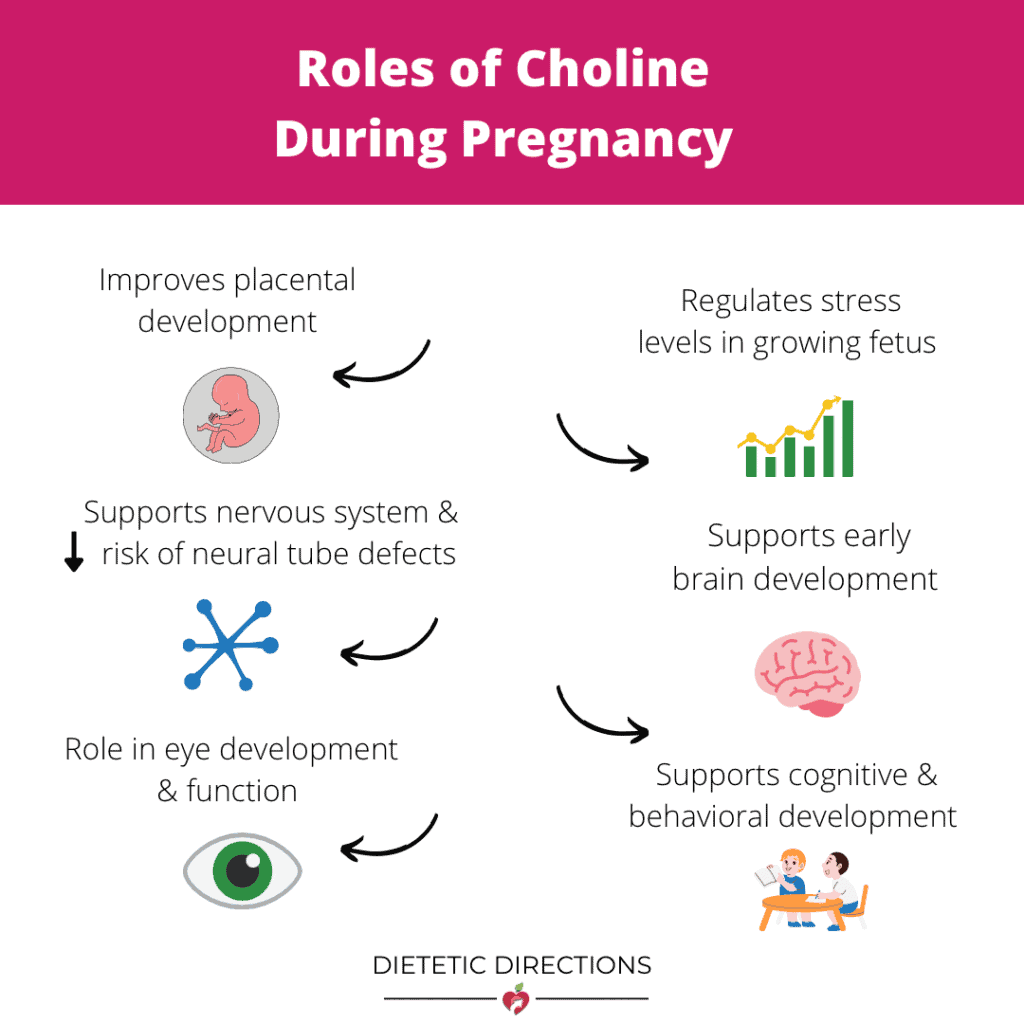
Are Pregnant Women Getting Enough Choline?
Research shows that ~90% of Americans (including pregnant and lactating women) are not meeting their adequate intake of choline. Similarly, the 2020 Dietary Guidelines for Americans identify choline as an under-consumed nutrient. Therefore, this underscores the importance of ensuring pregnancy nutrition is optimized, especially during critical neurological and organ development.

Prenatal supplements typically contain little if any choline (typically only 0–55 mg). Best bet is to get choline in your diet, whenever possible.
Choline Boosting Tips:
- Consume choline-rich foods. Some of my favourite top food sources include: eggs, beef, chicken, fish, milk and soy products.
- Meal prep choline-rich foods for convenience. For example, hard-cooked eggs, batch BBQ meats or fish and steam edamame for a snack or stir-fry.
- Speak with a Registered Dietitian if uncertain you’re getting enough choline (especially if at higher risk for inadequacy with pregnancy and breastfeeding, or being a vegetarian or vegan).
- Finally, be sure to speak with a Registered Dietitian before taking a choline supplement to ensure appropriate dosing for your needs.
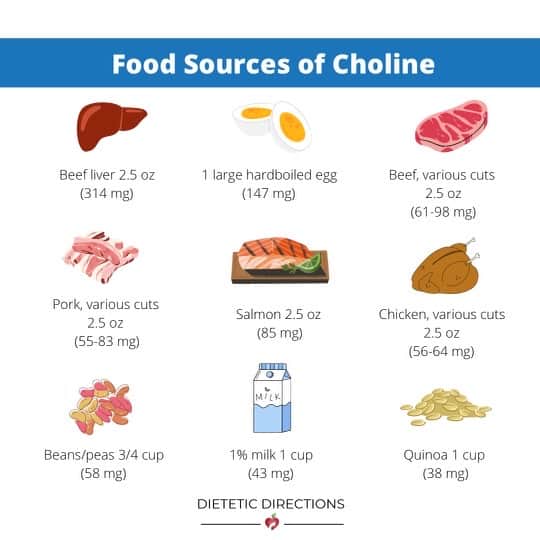
- Salmon as a Pregnancy Super Food
Lastly, salmon is our third pregnancy super food due to its high omega-3 content. These heart-healthy, anti-inflammatory fatty acids are crucial for baby’s brain and eye development as well as mom’s mood by decreasing risk for postpartum depression. Additionally, omega-3’s support maternal and fetal immunity. Salmon provides high-quality protein along with other nutrients like vitamin B12 and vitamin D, which supports bones and teeth. A 3-ounce (palm-sized) serving of salmon contains around 2,000mg of omega-3 (EPA & DHA) fatty acids.
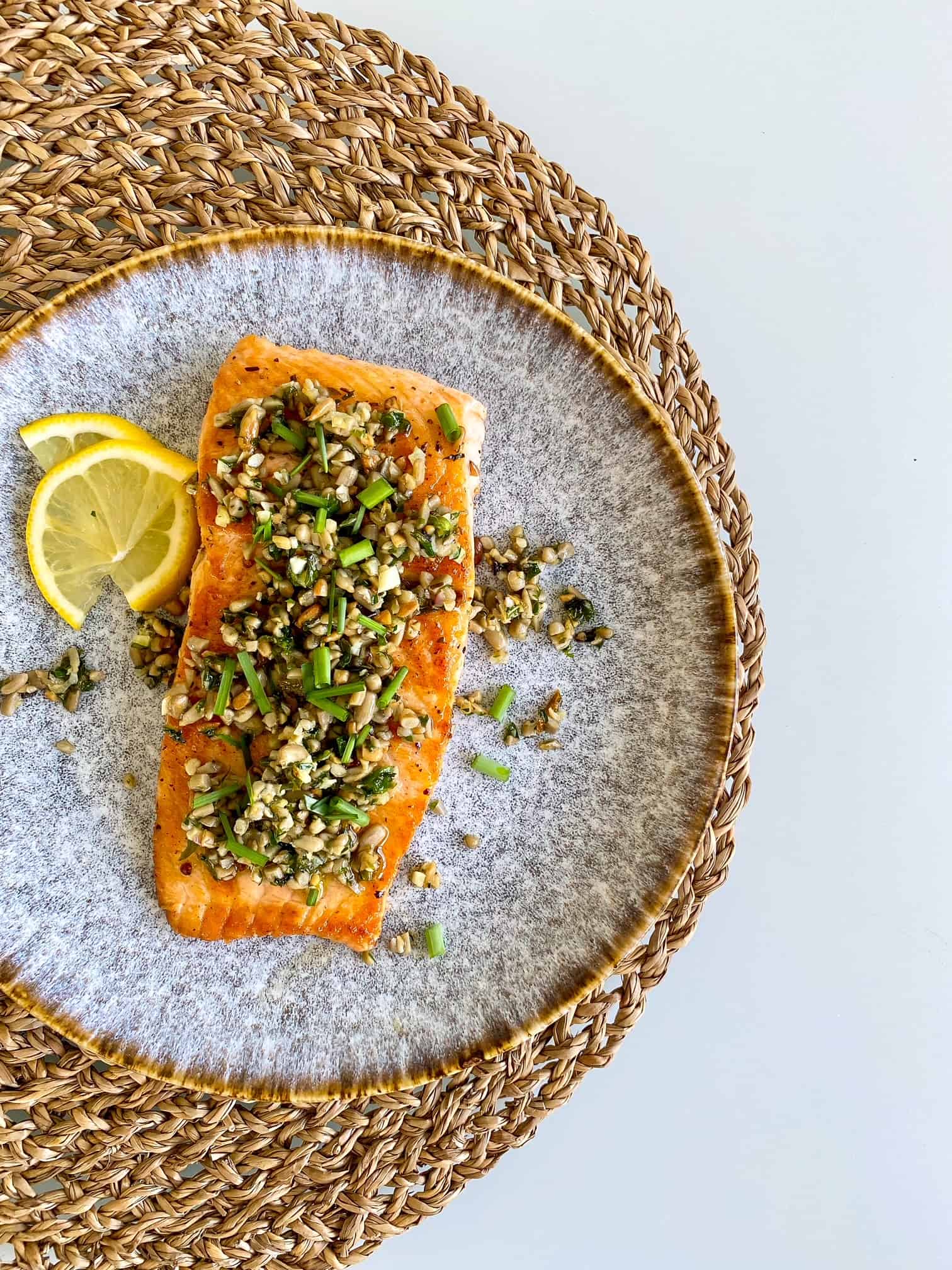
Salmon is an omega 3-boosting pregnancy super food. Try our Salmon Gremolata for a weeknight meal.
Omega-3 Recommendations:
The 2020-2025 Dietary Guidelines for Americans states that pregnant women or those breastfeeding should consume 8–12 ounces of seafood per week, choosing from varieties that are higher in EPA and DHA and lower in mercury such as salmon, herring, sardines, and trout. This equates to consuming fish two to three times a week, which would yield approximately 200-500 mg of EPA and DHA per day or 1,400-3,500 mg per week.
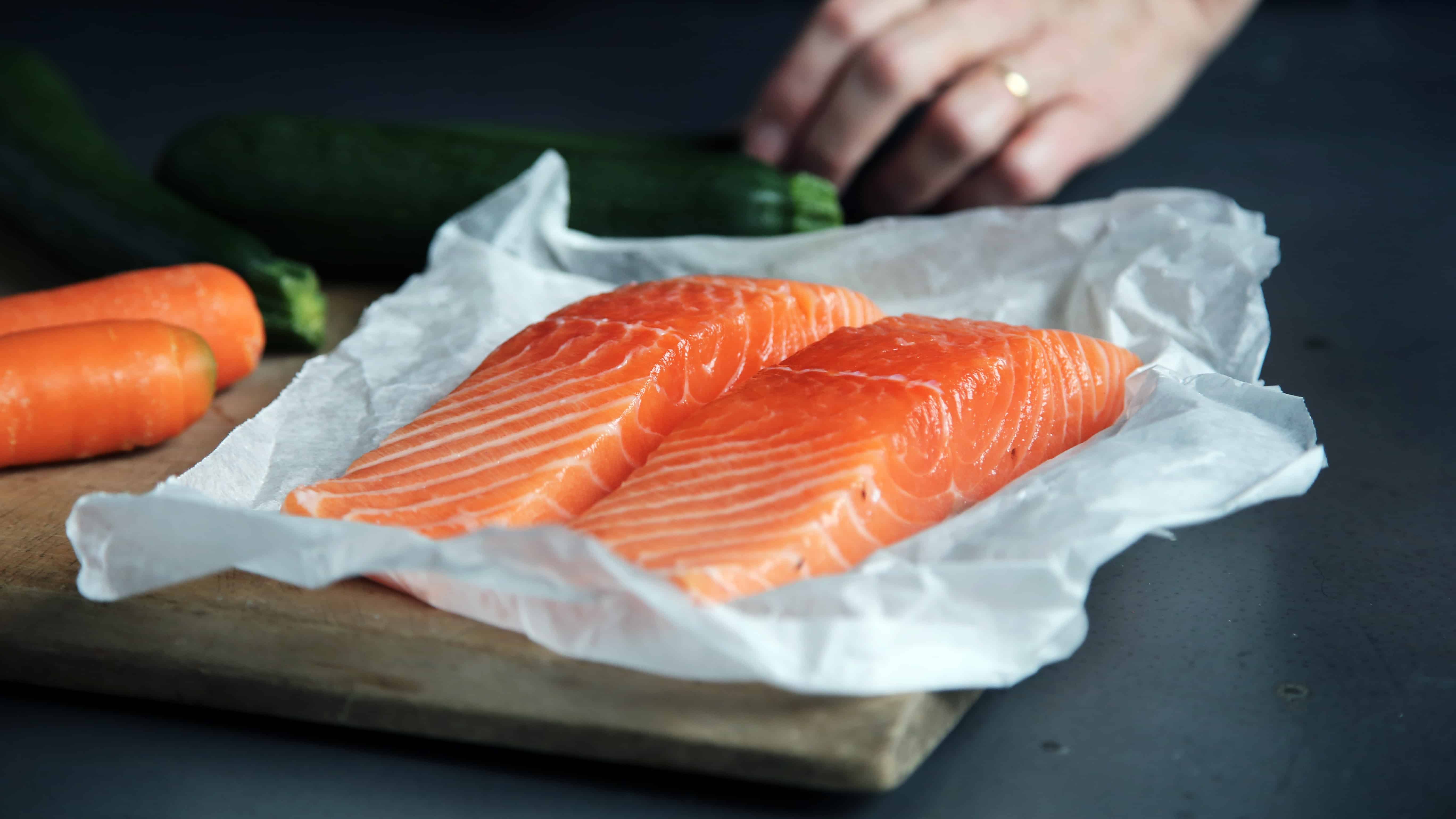
Unsure if you’re choosing omega 3-rich seafood? Check the EPA and DHA amounts in different foods.
Why are Omega-3’s Important During Pregnancy?
- Omega-3’s are deemed “essential fatty acids” since our body cannot produce them and they must be consumed in food or supplements.
- The fatty acid DHA supports brain and eye development. (Note: DHA and EPA are the most biologically available, active forms of omega-3, which come mainly from marine sources like fish and algae.)
- Play a role in determining length of gestation, fetal weight and preventing premature births.
- Lower triglycerides (fats in your blood) and blood pressure.
- May improve mild-to-moderate depression.
- Support fetal and maternal immunity
- If breastfeeding, mothers are the sole source of omega-3’s for their developing baby. Mothers with higher intakes pass more to their offspring in milk.
Wondering the difference between wild vs. farmed salmon? Read more!
Are Pregnant Women Getting Enough Omega-3’s?
Recent surveys indicate that pregnant women in the United States and in other countries eat little fish and therefore do not consume enough omega 3’s. This may be related to concerns about the adverse effects of mercury, financial restrictions, or preferences. Best bet is to meet your omega-3 requirements using food or supplements.
Uncertain about mercury and fish? Click here to find out more!
Omega 3 Boosting Tips:
- Keep salmon handy in the freezer or in cans. This allows you to whip up a sandwich, wrap, use as a salad topper or sauté a fillet for dinner.
- Enjoy omega-3-rich fish ideally two to three times a week.
- Explore a variety of fish and cooking methods.
- Utilize a Meal Theme to encourage consumption – like “Fish Friday” or Taco Tuesday with Salmon or Rainbow trout Tacos.
- Use canned salmon to make “salmon salad” filling to add in wraps, sandwiches or on crackers for a meal. Here’s my Italian Salmon Wrap recipe.
- Add anchovies or sardines into tomato sauce or pizza topping.
- Pan-fry fish for a 10-minute protein source to add to your meal.
- Grill fish on BBQ.
- Enjoy sushi with omega-3 rich fish. Spicy salmon rolls!
- Steam mussels for a nutritious option with omega-3 fats.

Speak with a Registered Dietitian to meet your pregnancy nutrition needs. Book with our team today!
Bottom Line:
Pregnancy is a crucial time to optimize nutrition for your health and your unborn baby’s. Hope you enjoyed my top three favourite pregnancy super foods –watermelon, eggs and salmon. Importantly, they are ways to encourage hydration and/or boost your choline intake as well as omega-3 fats. Finally, if you are uncertain if you’re meeting your pregnancy nutrition needs, speak with a Registered Dietitian for individualized recommendations and nutrition analysis.

Pregnancy nutrition counselling at Dietetic Directions involves achieving balanced eating and adequate nutrients for the fetus and momma.
Now it’s your turn! What are your favourite pregnancy super foods? Or how do you meet your hydration, choline and omega-3 needs?
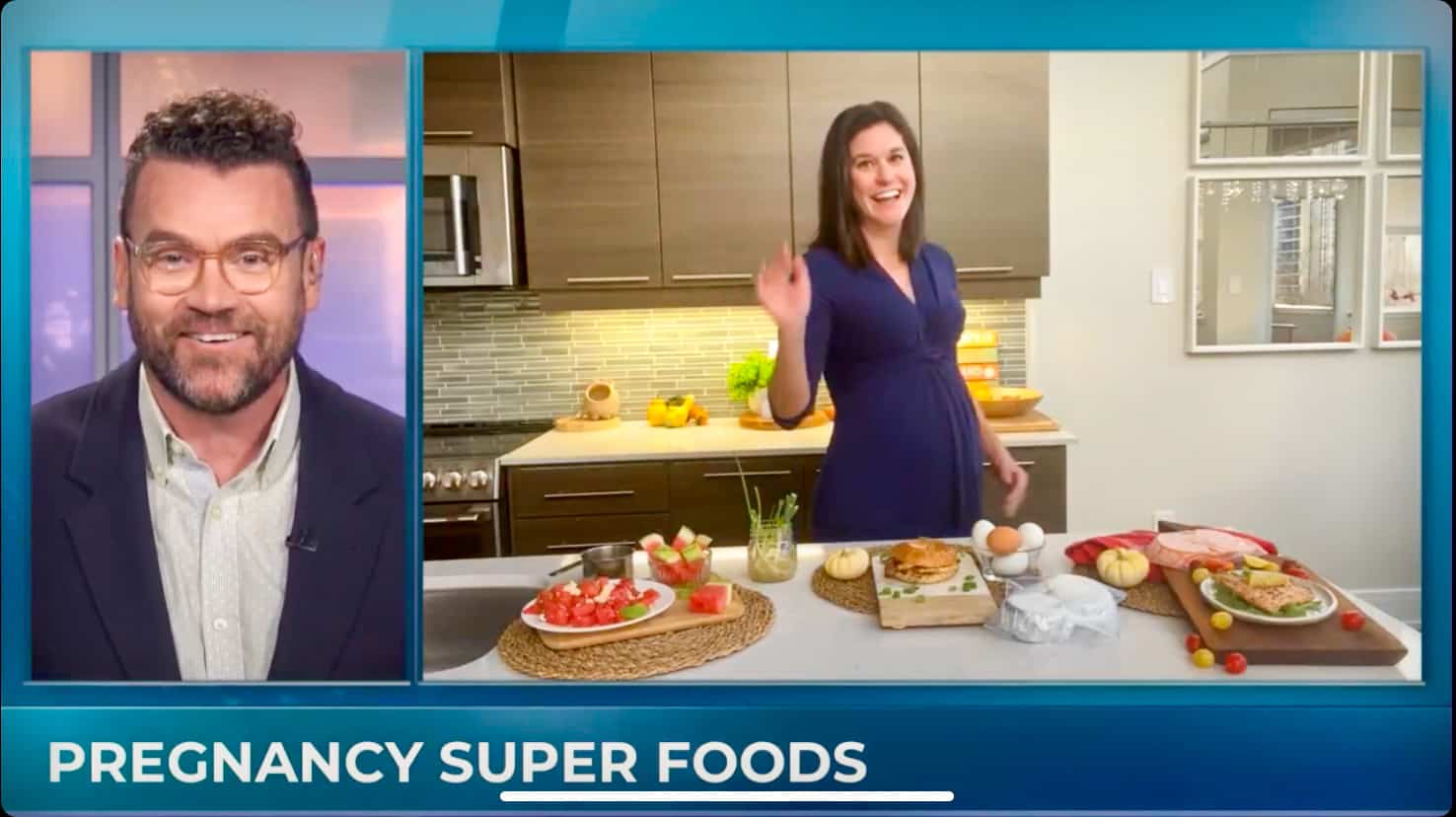
Watch Andrea on CHCH Morning Live speaking our Pregnancy Super Foods!


